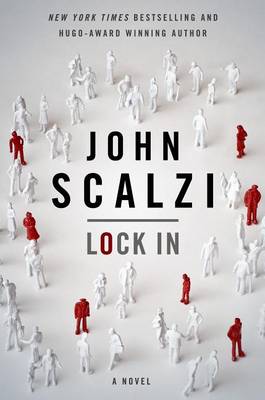Reviewed by Terri M. LeBlanc on
It wasn’t hard to imagine a world like the one Scalzi lays out in Lock In. With the recent rash of E. Coli breakouts, the Ebola epidemic and childhood illness likes mumps and measles making a comeback, the human nature to throw money at our problems, help the poor souls affected and legislate the heck out if was real. At points, I was drawing parallels between the novel and news stories about funding being provided (or not provided) for certain types of medical research. The availability and accessibility of medications and other technology for people with disabilities. And just our general treatment of those who are different from us. This is not a far fetched science fiction world. We are just mere steps away from Haden-world of Lock In. And in some cases, right in the middle of it.
The main characters in Lock In are fairly straight forward—the hard-nosed FBI agent and the rookie. How those characters interact is based on their experiences prior to becoming partners and there is not much new. That isn’t to say that I didn’t enjoy Chris Shane and Leslie Vann; there’s just nothing new that I haven’t seen before, relationship-wise, in a decent cop shop or movie. The real depth of the story comes with how everyone exists and interacts in the post-Haden Syndrome world. It adds some twists and turns to the old traditional cop story that caught me a bit off guard.
I definitely recommend reading Lock In for those readers who are fans of crime fiction as well as those who like lighter science fiction. The medical details regarding Haden’s is fairly straight forward and explained well right up front. The technology mirrors technology we already have. This novel would be a great way to dip your toes in the science fiction genre if you find it intimidating. And while GoodReads does have Lock in listed as the first in a series. The book does not end in a cliffhanger and stands on its own and is well worth the read.
This review was originally posted on Second Run Reviews
Reading updates
- Started reading
- 31 October, 2015: Finished reading
- 31 October, 2015: Reviewed
